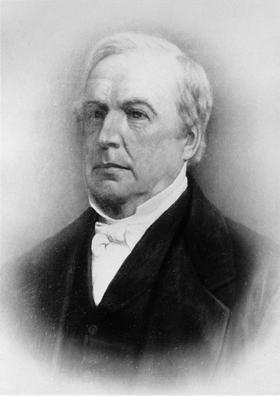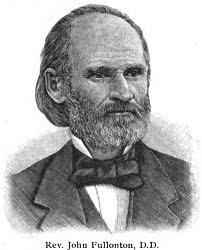
François Huber, also known as Francis in English publications and Franz in German publications, was a Swiss entomologist who specialized in honey bees. His pioneering work was recognized all across Europe and based on thorough observation with the help of several assistants due to his blindness.

Francis Wayland, was an American Baptist minister, educator and economist. He was president of Brown University and pastor of the First Baptist Church in America in Providence, Rhode Island. In Washington, D.C., Wayland Seminary was established in 1867, primarily to educate former slaves, and was named in his honor.

Cobb Divinity School was a Baptist theological institute. Founded in 1840, it was a Free Will Baptist graduate school affiliated with several Free Baptist institutions throughout its history. Cobb was part of Bates College in Lewiston, Maine, United States from 1870 until 1908 when it merged with the college's Religion Department.

Samuel Fenton Cary was an American politician who was a member of the U.S. House of Representatives from Ohio and significant temperance movement leader in the 19th century. Cary became well known nationally as a prohibitionist author and lecturer.

The Smithville Seminary was a Freewill Baptist institution established in 1839 on what is now Institute Lane in Smithville-North Scituate, Rhode Island. Renamed the Lapham Institute in 1863, it closed in 1876. The site was then used as the campus of the Pentecostal Collegiate Institute and later the Watchman Institute, and is now the Scituate Commons apartments. It was placed on the National Register of Historic Places in 1978.
Edward Cary Hayes (1868–1928) was a pioneer in American sociology and was a founder and president of the American Sociological Association.

Jesse Appleton was the second president of Bowdoin College and the father of First Lady Jane Pierce.

Calvin Ellis Stowe was an American Biblical scholar who helped spread public education in the United States. Over his career, he was a professor of languages and Biblical and sacred literature at Andover Theological Seminary, Dartmouth College, Lane Theological Seminary, and Bowdoin College. He was the husband and literary agent of Harriet Beecher Stowe, author of the best-seller Uncle Tom's Cabin.

Vaughn Seavey Blanchard was an American track and field athlete who competed in the 110 m hurdles and in the exhibition baseball tournament at the 1912 Summer Olympics. He attended Bates College in Lewiston Maine and later became a well known physical education proponent in Michigan.
Yisu Das Tiwari (1911–1997) was an Indian theologian and a leading participant in Hindu-Christian dialogue.

Rev. Ransom Dunn, D.D. was an American minister and theologian, prominent in the early Free Will Baptist movement in New England. He was President of Rio Grande College in Ohio, and Hillsdale College in Michigan. A Discourse on the Freedom of the Will is one of his most notable works.

Rufus T. Babcock was an American clergyman and the second president of Colby College in Waterville, Maine.
Rev. Beniah Longley Whitman was the 11th president of Colby College, and later Columbian College.

George Harvey Ball (1819-1907) was an American academic, pastor, writer, and founder of Keuka College in New York.

John Fullonton (1812-1896) was an American pastor, academic and legislator.

George T. Day (1822–1875) was a Free Will Baptist writer, publisher, pastor and professor.

William Winsor (1819–1904) was a philanthropist, town treasurer, bank officer, farmer, supporter of education, and co-founder of the Greenville Public Library. He was from Smithfield, Rhode Island where the William Winsor School was named after him.

Thomas L. Angell (1837-1923) was a Free Will Baptist pastor, academic, leader of the Lapham Institute, and early professor at Bates College in Maine.
Daniel McBride Graham (1817–1888) was a Free Will Baptist pastor, abolitionist, writer, and inventor who served as the first president of Hillsdale College, serving from 1844 to 1848 and the fourth president from 1871 to 1874.















